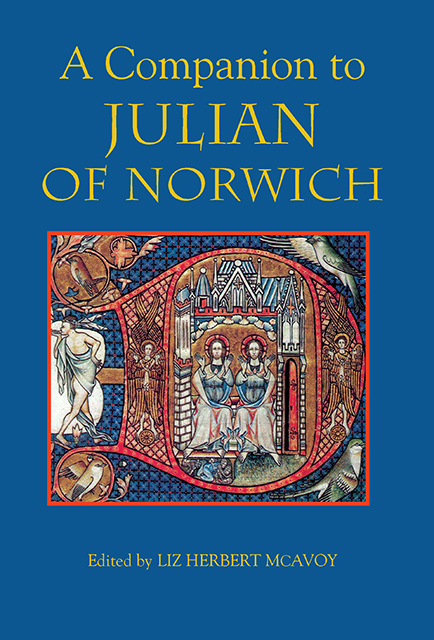6 - Anchoritic Aspects of Julian of Norwich
Published online by Cambridge University Press: 10 March 2023
Summary
That we know next to nothing about our author has long been a truism of Julian studies. Serenus Cressy tells us that, for all his searching, he ‘could not discover any thing touching her, more than what she occasionally sprinkles in the Book it self’. For Colledge and Walsh she is ‘an enigmatic figure’; for Grace Jantzen she is likewise ‘an enigma’; for Christopher Abbott she has ‘a certain “disappeared” quality’, and in their recent edition Watson and Jenkins are able to offer only ‘a fragmentary biography’. The fragments for such a biography are admittedly few, as McAvoy also points out in her introduction to this volume: four wills (which, since the disastrous Norwich Central Library fire of 1994, have effectively become three), the account, in her Book, of Margery Kempe's visit to consult ‘Dame Ielyan’ about her ‘wondirful reuelacyons’ in 1413, and of course the testimony of Julian's book(s) themselves. All but the last identify Julian as an anchorite, as do the rubricators of the Amherst and Paris manuscripts of her Vision and Revelation.
What, though, does this mean? At one level, the response to this question ought to be, as Langland's Ymaginitif might have put it: there are books enough to tell men what anchoritism is. There are indeed now a number of good general introductions to the anchoritic vocation in the Middle Ages. But studies of Julian seem not to have made much use of them – perhaps another instance of the tendency Nicholas Watson has discerned for critics too easily to think of Julian as just ‘a voice without a context’. For historicization, most writers turn instead to another literary text, whose relevance as ‘context’ ought to require more examination than it is sometimes given. At least since 1905, when Dean William Inge introduced both works to a wider public in one of his Westminster lectures on mysticism, Julian has been discussed alongside Ancrene Wisse. In some respects this is not unreasonable: though a product of the early thirteenth century, the Wisse was certainly still being read in the fifteenth (albeit most of the readers we know about were not in fact anchorites). That other early classic of anchoritic guidance, Aelred's De Institutione Inclusarum, was likewise newly translated into English in the late fourteenth and again in the mid fifteenth century. No doubt these works had much to offer, mutatis mutandis, to the latemedieval anchorite.
- Type
- Chapter
- Information
- A Companion to Julian of Norwich , pp. 75 - 87Publisher: Boydell & BrewerPrint publication year: 2008
- 3
- Cited by

